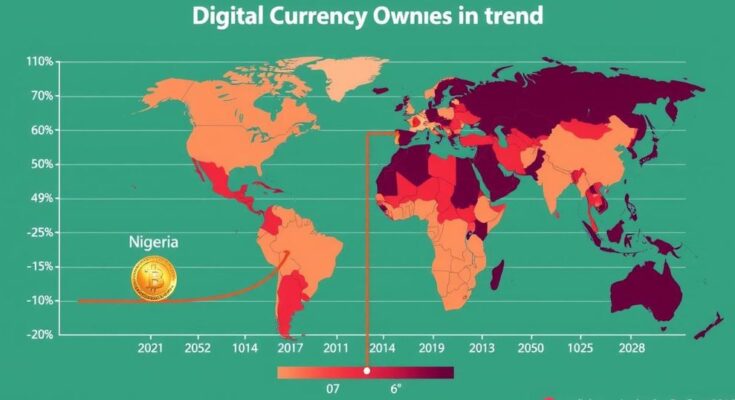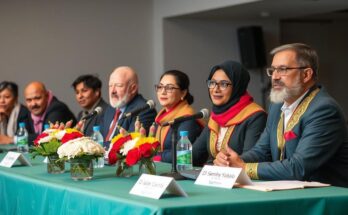Nigeria and South Africa lead globally in digital asset ownership, with significant awareness and understanding among their populations. A high percentage of respondents have engaged with digital assets, driven by distrust in traditional banking systems. Concerns regarding volatility and security issues persist, presenting challenges for future adoption. Joseph Lubin of Consensys noted that Nigerians seek greater control over their online identities, indicating a desire for reform in digital finance.
A recent study conducted by the blockchain incubator Consensys has positioned Nigeria and South Africa as the global frontrunners in digital asset ownership. The Web3 Perception report revealed that an astounding 99% of Nigerian respondents are aware of digital assets, with 77% expressing a comprehensive understanding of the concept. In comparison, only 54% of individuals in the United States and 45% in the United Kingdom share a similar level of understanding.
Additionally, the report highlighted that 74% of Nigerians familiar with digital assets have owned them at some time, with 42% currently maintaining ownership. This trend is mirrored in South Africa, where 68% of respondents have previously owned digital assets; however, only 22% currently retain ownership. Furthermore, about half of those surveyed in South Africa reported familiarity with Web3 technologies and non-fungible tokens (NFTs).
The high levels of digital asset ownership in both Nigeria and South Africa appear closely linked to widespread distrust in traditional banking systems. According to the report, 65% of South African respondents believe that improvements or a complete overhaul of the financial system is necessary, while Nigerian respondents exhibited even greater skepticism, with only 10% asserting confidence in their banking system’s functionality.
Moreover, Joseph Lubin, CEO of Consensys, remarked on the innovative uses of digital assets among Nigerians, noting that they seek enhanced control over their online identities and data privacy. He commented, “In terms of data privacy, 92 percent of Nigerians and 87 percent would like to have more control over their identity on the internet, while over half of respondents think that decentralization could improve traditional banking and social media platforms.”
This trend of engagement with blockchain technology is further supported by Nigeria’s current ranking as the second highest nation worldwide for digital asset adoption, surpassed only by India. Nevertheless, concerns such as volatility, scams, and issues related to privacy and security remain prevalent among Nigerian respondents, with over half citing these as significant barriers to further participation in the digital asset space.
Nigeria’s leadership in digital asset adoption signifies a massive opportunity for leveraging blockchain technology to enhance identity control and privacy, presenting a potential transformation of conventional banking and financial practices.
The global landscape of digital asset ownership is rapidly changing, and the latest findings from the Web3 Perception report by Consensys reveal that Nigeria and South Africa are at the forefront. As the leading economies in Africa, both countries exhibit high levels of awareness and understanding of digital assets, indicating a departure from traditional financial systems. This shift is fueled by a combination of factors including a general distrust of banks, the pursuit of improved data privacy, and the growing interest in decentralized technologies such as blockchain and NFTs.
In conclusion, the recent report highlighting Nigeria and South Africa’s leadership in digital asset ownership reflects not only a significant global trend but also reveals critical insights into the motivations and attitudes of their populations toward digital finance. With a compelling drive towards enhancing control over personal data and a desire for reform in financial practices, the foundation is laid for accelerated adoption of blockchain technology in these nations. However, it is the existing challenges regarding volatility and security that must be addressed to fully unlock the potential of digital assets in Africa’s two largest economies.
Original Source: coingeek.com




